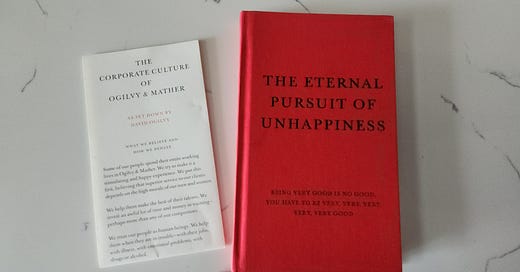The Eternal Pursuit of Unhappiness
Or, channeling your inner drive for improvement without it becoming toxic
In 2009, every Ogilvy employee received a book provocatively titled The Eternal Pursuit of Unhappiness: Being Very Good is No Good, You Have to Be Very, Very, Very, Very, Very Good. It was written by people at the company and included a historical memo from David Ogilvy, The Corporate Culture of Ogilvy & Mather, glued to the back cover. This memo, both timeless and succinct, quickly became the main point of interest for me.
At first, the book’s title struck me as a strange message—was Ogilvy really asking us to embrace unhappiness in our work? Inside the introduction, the book framed Divine Discontent as a motivator for hard work, winning, and outshining the competition. However, the attached memo offered a different, richer perspective on the concept.
In The Corporate Culture of Ogilvy & Mather, Ogilvy writes, “We have a habit of divine discontent with our performance. It is an antidote to smugness.” For him, divine discontent was not about chronic dissatisfaction but about avoiding the smugness that comes from feeling “better-than-thou.” He is setting down that divine discontent should be a check against pride. He does not use it as the stick to generate great work, which the authors imply.
Yes, his culture memo includes statements like “We have little time for office politicians, bullies, paper warriors, toadies, pompous asses, prima donnas,” which lays out Ogilvy’s vision for a work environment built on gentleness, hard work, and earning the clients respect.
A more pertinent line the authors of this book could have picked up from Ogilvy is, “The line between pride in our work and neurotic obstinacy is a narrow one.” To Ogilvy, this meant believing in one’s work and striving for effectiveness, without allowing that belief to become rigid or self-satisfied. But hey, “The Pursuit of Unhappiness” title is more intriguing than “Rubbing Up Against Neurotic Obstinacy”.
Ultimately, Ogilvy’s culture memo encourages us to create exceptional work and believe in it—but without the smugness that alienates others. As the authors of this book have wisely said, “…it’s impossible to improve our reputation before we improve ourselves, and meaningless to put our personality (however sparkling) ahead of our character.”
The Pursuit of Unhappiness details 8 essential habits that are positive ones. Each of the habits are presented as antidotes to what are essentially energy sucks (vices). Big creative ideas take energy. If an agency is not sustaining it’s energy, they won’t win.
I’m so pleased that this book is actually not about the pursuit of happiness. In Ogilvy’s culture memo he presents “Divine Discontent” as a remedy for the trouble your ego can get you into. The staff who wrote about the 8 additional remedies did a fantastic job of carrying on Ogilvy’s vision.
Creative Burst Coaching offers a program to mentally strengthen these 8 virtues as presented in the book. The 8 habits “belong to the whole church” … as in the creative community. Lets practice together.
Learn how to strengthen courage, curiosity, candour, and persistance with coaching!






One interesting habit I’ve noticed in myself is that I always end up destroying my creative work. Anything I paint, draw, or build—I end up dismantling, mangling, or cutting it up. I’m not even sure why I do it, but it feels like once it’s made, I can’t just let it sit or stand as is. Maybe it’s a weird form of ‘Divine Discontent’ or my own way of not getting too attached to the finished product. Someone once told me that destruction is a form of creativity, which is an idea I keep circling back to. It might be another way of keeping complacency at bay, but I’d love to know if you think it fits into the themes of the article.